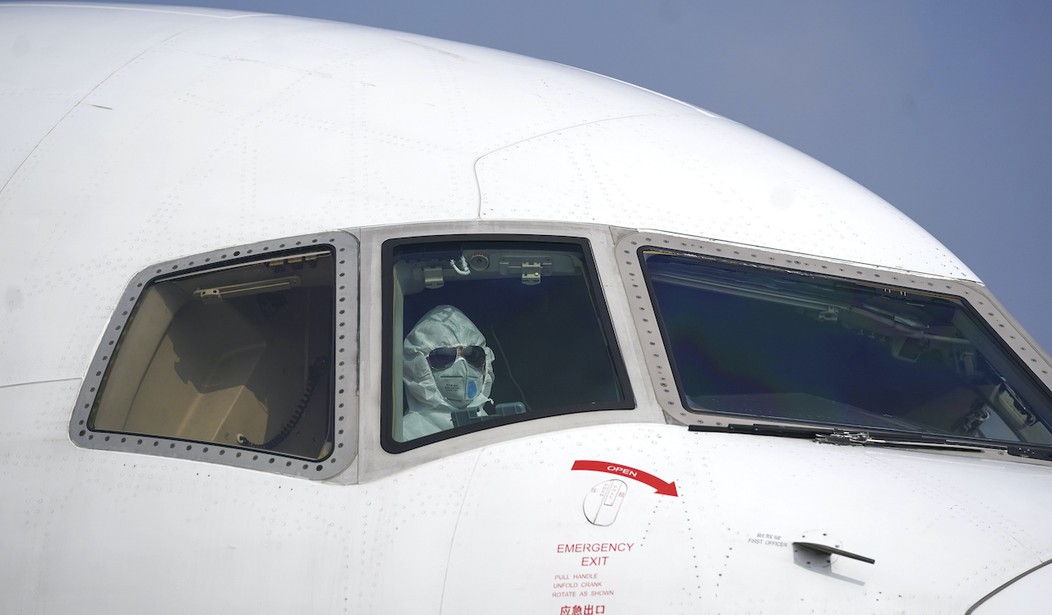The coronavirus outbreak has put the airline industry into a complete nosedive as government restrictions on travel and guidance on social distancing have grinded U.S. air travel to a halt.
The situation is now so dire that flight cancellations are rapidly outpacing new flight bookings and industry trade groups have estimated that revenue loss could total $113 billion globally. A financial assistance package from the federal government to rescue the industry is seemingly imminent as Treasury Secretary Steven Mnuchin was on Capitol Hill Tuesday meeting with senators to discuss the terms of a $50 billion deal.
Sticking to their playbook, Senate Democrats are treating the crisis as an opportunity by conditioning their support of any financial assistance to massive re-regulation of the industry while insisting on unrelated provisions including those to “combat climate change.”
Sen. Sheldon Whitehouse (D-RI) insisted that “carbon offsets,” which would deliberately raise airfare costs during a demand crunch, be a prerequisite of any deal. Not to be outdone by their colleague, Senators Richard Blumenthal (D-CT) and Ed Markey (D-MA) are publicly insisting on a new batch of half-baked airline regulations ranging from price controls on baggage fees to government mandates on passenger seat size. Why United States Senators are spending their time legislating airline seat sizes during a global pandemic is beyond comprehension.
Yet the reflex of Democrats to push for heavy regulation of airlines in their time of desperation deserves serious scrutiny. Given the entire point of a relief package is to address temporary cash flow problems across the industry due to the virus’s impact on demand, regulations that would increase airfare costs and further hamper consumer demand are antithetical to the goal of Congress.
Recommended
While voices on the left, including those in the New York Times, complain about past deregulatory actions allowing airline companies to collect revenue from baggage fees, they ignore the larger consumer benefit of steadily decreasing airfare prices. Passengers are benefiting from a 27.6% reduction in the average cost of a U.S. domestic flight since 1995, despite a 60% increase in passenger volume in the same timeframe.
The decline in airfare costs is due precisely to the deregulatory agenda of the federal government towards the airline industry. Less regulation has opened up the door to greater competition for legacy airline carriers in the form of ultra-low-cost-carriers offering few thrills and an a la carte option of services and fees. It is these companies benefiting from less regulation that pose the greatest threat to the legacy airlines the political left seemingly abhors. Yet these carriers also have the most price-sensitive consumers who would be turned off by the higher airfares resulting from increased regulation. Democrat proposals to increase regulations would perversely reward the larger carriers they claim to dislike at the expense of small carriers and consumers.
Democrats' motivation to punish the airline industry is as equally concerning as the proposed regulations themselves.
The media and the political left have spent the past week criticizing airline companies for seeking federal aid after using past revenue on stock buybacks. Frankly, this is a bogus line of attack. Buybacks occur when a company is reinvesting in itself by returning funds to shareholders and the economy. Contrary to the left’s narrative, stock buybacks do not come at the expense of productive investment.
Furthermore, to argue the current state of the airline industry is due to widespread financial mismanagement across all companies is simply dishonest. Airlines are approaching insolvency because of their compliance with government travel bans and restrictions necessary for curbing a public health emergency. It is government intervention in the marketplace, however necessary and appropriate that intervention is, that is responsible for the airline industry’s impending insolvency.
This does not mean the government should offer a blank check to airline companies, but measures including tax relief and lessening burdensome regulations should certainly be considered. This includes tax relief on certain excise taxes paid by airline companies, including temporary repeal of taxes on cargo, tickets and jet fuel. This will also increase consumer demand as taxes currently account for over 20% of the cost of a domestic airline ticket.
The Trump administration and state and local governments have responded to the coronavirus outbreak by wisely suspending several rules and regulations in order to accelerate our response to the virus and reduce its spread.
This same logic should be applied to any financial assistance given to the airline industry. Conditioning government support on increased regulation of the industry is a recipe for exacerbating the crisis and should be avoided at all costs.
Mike Palicz is the Federal Affairs Manager on Transportation at Americans for Tax Reform.

























Join the conversation as a VIP Member